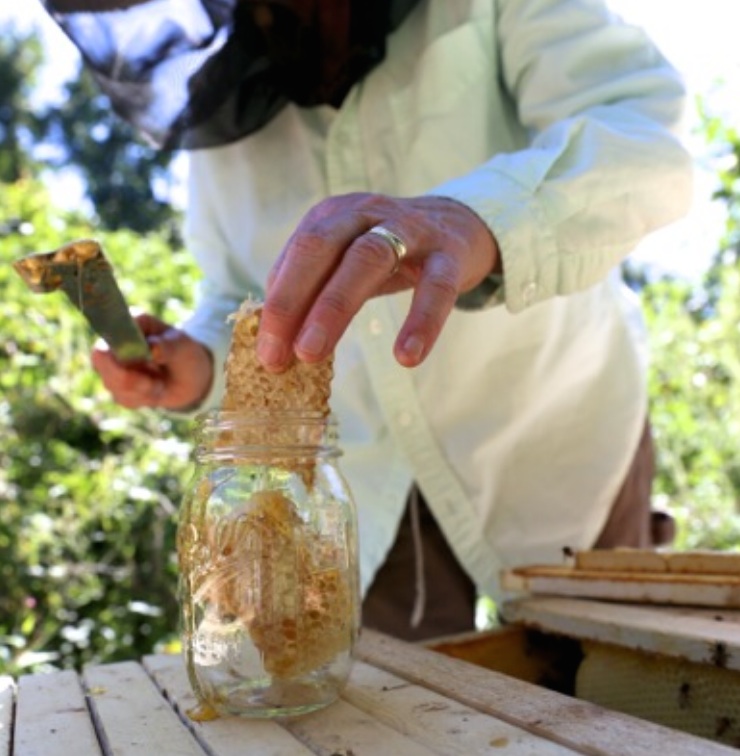If you buy your honey from the grocery store, it probably comes to you from China or India (or both…and more…all mixed together and heated in a massive industrial pot). I have nothing whatsoever against these other countries…I simply demand that my honey come from local bees that forage on local flora. Simple as that.
The worst part is this: The bees that made your grocery-store-bought honey were treated with some very serious chemicals inserted directly into their hive.
What’s more: If you buy your honey from a local source such as a farmer’s market or from that nice old man at the end of the lane, the bees that made it were almost certainly also treated with the very same, very serious chemicals that were inserted directly into the Chinese and Indian hives. And even though the bottle says your honey is pure honey, it’s not. It’s full of chemicals that a majority of the world’s beekeepers believe is necessary to use in order to keep their bees alive. And I’m serious about this. It’s appalling.
I tell you this because I am experiencing it first hand. I have been sold (and until recently, I was still in possession of) the assortment of chemicals of which I speak. For years, they waited patiently in my garage for me…thank goodness I never used them. Other than a growing number of renegade, cutting-edge, crazy-sounding, treatment-free beekeeping prophets, every single solitary beekeeper I know use those chemicals without even thinking about it. When to treat the bees is taught in beginner’s bee schools. And then everyone wonders why the bees are dying. They’re dying because there are chemicals everywhere they fly and also in their hives. And the poisons build up. Just as it does in us.
It’s not the beekeepers’ fault. Most of them know no other way and have not considered alternatives. But there is another way. And it’s up to a small number of curious beekeepers who naturally gravitate to research and who are hell-bent on returning to natural beekeeping (which, I admit, it a problematic term as there is nothing “natural” about keeping bees) to change the thinking of an entire beekeeping culture.
To my mind, bees are equivalent to the canary in the coal mine—their dying like this is a sign that we humans had better change something. And immediately.
Have I whet your appetite for more? I hope so.
Here’s what you can do to help, Reader:
- If you want to begin keeping bees, consider the very fun return to natural beekeeping. To do so, you can start by reading the wonderfully smart and surprisingly enjoyable Complete Idiot’s Guide to Beekeeping. It’s not for idiots. It’s for smart people, and it’s written by smart people whom I now know. They’re smart in person, too. The book series simply has a dumbed-down title. It’s a wonderful beginning point for those wishing to keep bees without the use of chemicals.
- If you already keep bees but want to stop the insane chemical applications and stop losing your bees every single winter and have healthier, faster, smaller, calmer bees, begin by reading the Complete Idiot’s Guide to Beekeeping. And join the Organic Beekeepers Yahoo group. Yes, some of those people are crazy, but they make sense. And read every word of Michael Bush’s delightful website.
- Also read Kirk Webster’s writings, which are now available on the web.
- If you don’t keep bees but you want to eat pure local honey—honestly pure honey—made by happier, healthier bees that have not ever been treated by UNBELIEVABLY STRONG CHEMICALS APPLIED DIRECTLY INTO THE HIVE AND INTO YOUR HONEY, then please begin asking your honey supplier to consider the above points. Gently and gently and gently remind your supplier each time you purchase your nice jar of honey that there is another way. It’s scary and difficult to change the way we do things…we all know that. That’s why we’ve got to be gentle. But it’s also very fun to do what we all know is right. It’s exhilarating. And your local beekeepers want to do it…they simply need your encouragement. And they need to see others doing it. Which is where TwoHoneys Bee Co. comes in. :)

